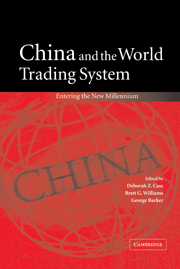Book contents
- Frontmatter
- Contents
- List of figures
- List of tables
- List of contributors
- Preface
- Acknowledgements
- Abbreviations and acronyms
- Introduction: China and the reshaping of the World Trade Organization
- PART I The world trading system
- PART II The accession
- PART III China – the domestic sphere
- 6 The state of the Chinese economy – structural changes, impacts and implications
- 7 Trade policy reform and China's WTO accession
- 8 China's WTO entry in labour surplus and Marxist terms
- 9 Enforcement of WTO agreements in China: illusion or reality?
- 10 China: trade, law and human rights
- PART IV Trade in goods
- PART V Trade in services and competition policy
- PART VI Intellectual property
- PART VII Dispute settlement
- Select bibliography
- Index
8 - China's WTO entry in labour surplus and Marxist terms
Published online by Cambridge University Press: 28 July 2009
- Frontmatter
- Contents
- List of figures
- List of tables
- List of contributors
- Preface
- Acknowledgements
- Abbreviations and acronyms
- Introduction: China and the reshaping of the World Trade Organization
- PART I The world trading system
- PART II The accession
- PART III China – the domestic sphere
- 6 The state of the Chinese economy – structural changes, impacts and implications
- 7 Trade policy reform and China's WTO accession
- 8 China's WTO entry in labour surplus and Marxist terms
- 9 Enforcement of WTO agreements in China: illusion or reality?
- 10 China: trade, law and human rights
- PART IV Trade in goods
- PART V Trade in services and competition policy
- PART VI Intellectual property
- PART VII Dispute settlement
- Select bibliography
- Index
Summary
Indeterminacy: spotting the issue
This chapter contributes to the subject of China's WTO accession from a more theoretical perspective than that which underlies questions of the economic impact of entry on various sectors, the substantive legal regime that will be in force, or the consonance of China's trade laws and practices with that regime. At the same time, neither can nor should the discussion here avoid an occasional foray into empirical matters.
This chapter considers the US and EU bilateral deals with China from two different schools of thought in development economics, one capitalist and one Marxist. Each school permits a different inference to be drawn about the terms of these deals. These inferences are not inconsistent, but neither is cheerful.
The capitalist framework is the Fei–Ranis labour surplus model. In this framework, the story of economic growth is a story of transition from a largely agricultural economy to a largely industrial economy. International trade plays the role of handmaiden, not protagonist, in this story. To facilitate the agriculture-to-industry transition, a developing country can be helped by market access for industrial products in which it seeks to gain an international comparative-exporting advantage. That country can also be helped by imports of goods and services it needs in the industrial export sectors (for example, raw materials, intermediate goods, capital equipment and technical assistance) and to alleviate strains in the agricultural sector during the industrialization process (such as certain foodstuffs).
- Type
- Chapter
- Information
- China and the World Trading SystemEntering the New Millennium, pp. 115 - 131Publisher: Cambridge University PressPrint publication year: 2003



